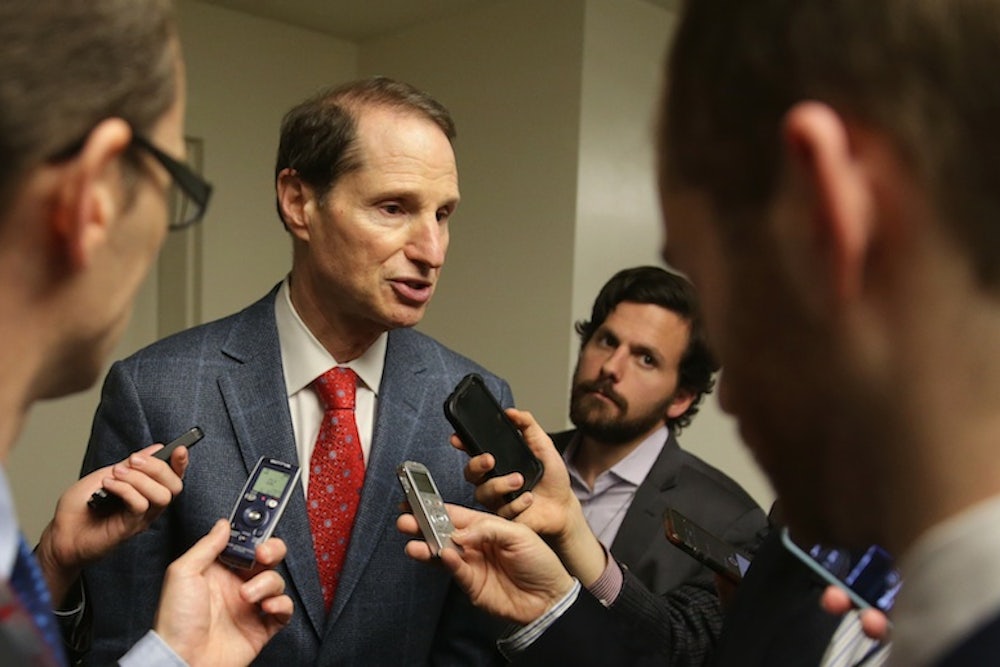The Senate Finance Committee, which has jurisdiction over taxes and the big federal entitlement programs, just might be the most powerful committee in Congress. And in modern times its chairman has been relatively conservative, even when the Democrats were in charge. Is that about to change?
From 1987 to 1993, the chairman was “Loophole Lloyd” Bentsen—so named because of his skill at delivering tax breaks for Wall Street and oil friends in Texas. His successor, from 1993 to 1995, was New York Senator Daniel Patrick Moynihan—an intellectual and committed progressive on some issues, but one who famously helped kill President Bill Clinton’s health care plan by declaring “there is no health care crisis in this country.” The next Democrat to take over Finance was Max Baucus, who broke ranks to help President George W. Bush pass huge tax cuts and the Medicare drug benefit.
But with Baucus on his way to China, to serve as ambassador, Finance has a new chairman: Ron Wyden of Oregon. And things are going to be a little different—particularly if Democrats win enough seats in November to hold the majority. By any reasonable standard, Wyden is a bona fide liberal—a staunch believer in universal health insurance, a more progressive tax code, and greater public investment. And unlike most of his predecessors, he’s not in the pocket of Wall Street. In 2012, Americans for Democratic Action and the Service Employees International Union each gave Wyden a rating of 95 percent. The conservative group FreedomWorks gave him a zero.
Still, Wyden has one thing in common with the Democrats who wielded the committee gavel before him. He frequently angers his party by negotiating publicly—and forging alliances—with prominent Republicans, usually while he’s trying to drum up support for his ambitious and complex policy ideas. Wyden alienated pretty much every other member of his party in late 2011 when, with little advance warning, he crafted a Medicare reform plan with Representative Paul Ryan—right at the moment when Democrats, gearing up for the 2012 elections, were trying to convince everybody of Ryan’s extremism.
“His background is as a progressive, but a lot of the things that he’s done don’t necessarily fit,” said Norm Ornstein, a fellow at the American Enterprise Institute and long-time observer of Congress. “He has relentlessly, vigorously sought to find ways of creating innovative bipartisan approaches to different policies.”
Rumor has it that, come 2015, Ryan will take over the House Ways and Means Committee, a committee whose jurisdiction and power is roughly analogous to what Finance has in the Senate. That could make for some interesting negotiations across the aisle and between the two chambers. But even if Ryan doesn’t take over Ways and Means, Wyden could have a lasting impact on policy in a few key areas. Here are three of them:
1. Tax Reform. Wyden laid out an ambitious tax agenda at a conference on income inequality at the University of Southern California earlier this month. To start, he wants to tax investment income closer to ordinary income, though not necessarily at the same rates. He wants to increase the standard deduction, and simplify both the Child Tax Credit and Earned Income Tax Credit. In addition, his agenda calls for the creation of a new investment account for all Americans at birth.
In 2010, Wyden worked with former Senator Judd Gregg (R-N.H.) to create the Bipartisan Tax Fairness and Simplification Act. He has since found another Republican co-sponsor in Indiana Senator Dan Coats. The bill calls for three tax brackets at 15, 25, and 35 percent. It also increases the standard deduction while repealing the Alternative Minimum Tax. It would set the corporate tax rate at 24 percent while ending some smaller business and individual tax preferences. The Tax Policy Center found this plan would make the tax code slightly more progressive and was about deficit neutral, although that was relative to tax policy in 2010, before the fiscal cliff deal that raised rates on the highest earners.
It’s difficult to summarize these proposals as liberal or conservative. As is so often the case with Wyden’s policy agenda, they've got elements of both—and getting them through Congress won’t be easy.
“Tax reform is the Holy Grail, if you will, for any chairman of the Finance Committee,” said Jim Manley, longtime aide to Majority Leader Harry Reid and the late Senator Ted Kennedy. “Until there’s some meeting of the minds on revenue increases, it’s going to be very difficult to imagine getting anything done.”
Then again, Wyden has never let political feasibility—or lack thereof—stop him from working on issues close to his heart. He’s going to keep talking about these things, which for fellow Democrats could be a blessing, a curse, or both.
2. Fast Track Trade Authority. Unlike Baucus, who was one of the staunchest advocates for giving the White House trade promotion authority, Wyden opposes it—as do many other Democrats, including Reid.
“The position that Wyden has will matter less than the fact that a very substantial number of rank-and-file members of the Democratic Party are not going to jump to give him fast track authority,” Ornstein said.
3. Medicare. Wyden is one of the sponsors of the Better Care, Lower Cost Act, which attempts to move Medicare away from the fee-for-service payment scheme. It would give providers more skin in the game with patient care, allowing them to capture more of the savings, but also risk facing greater costs.
Wyden’s very public work with Ryan on Medicare freaked out a lot of liberals, but Manley says liberals should not be worried about Wyden undercutting the rest of the party.
“He’s demonstrated a willingness to buck the leadership before,” he said. “I’m sure he’s going to do it again, but he’s also a team player. He wants to do what’s best for the state, the caucus and the country.”
